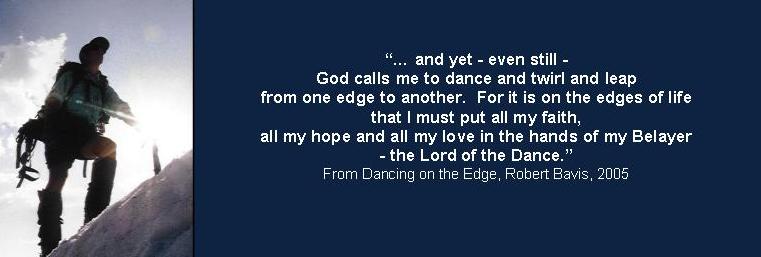As I conclude my 6th and final class at UMass, I've been asked to share my thoughts about my experiences as a participant in the learning communities that were temporarily created (to varying degrees) during each class. I must be honest in saying that I have found that I have not always practiced what I preach (i.e. what I say I "value" but did not always model). I have come to believe that though there may be value for an instructor to try and facilitate the development of a learning "community" amongst their distance learners, the intrinsic nature of distance learning makes it difficult at best - both for instructor and student alike.
The tacit requirement for the development of any community is "buy-in". Individuals must WANT to be a participant. Though a community always has participants with varying degrees of buy-in, there must be some recognizable evidence of their commitment to that community to actually BE in community. Otherwise, those with little commitment remain in the "doorway" (i.e. maybe not sure of or have a fear of what might be expected of them if they were to enter)
In my distance learning experience, I can think of only a couple of instructors who did more than just assign a group project in hope there would be more than a token opportunity given for students to co-create a semester-limited learning community.
It was in only one class that I felt more than a touch of community, though it came only within a small group (of 3) assigned a challenging project. I think that the extra challenge (difficulty) of the project and the logistics required for my group mates to accomplish the academic goal, provided a strong "invitation" for commitment to one another. Thankfully, each of us brought different and complimentary skills and experiences to the project. Our strengths and limitations were well-balanced - we needed each other!
It was this mutual need that over rode any desire to step away. Though we were only 3, we were a fully functional community. We flexed with varying time/job related hurdles. Some carried more of the load than others (at times) but there was no resentment on that matter. We managed to "put our heads together" by maximizing our use of all the technology available to us. In the end, we were proud of the product and process that resulted!
In hindsight, it would have been great if the concept of and the instructor-facilitated modelling of community building would have been discussed and facilitated in the prerequisite class for this certificate program!
Despite the many challenges of actually creating/facilitating the development of a "true" (whatever that might mean!) or at least an "aspiring" learning community, I have experienced a sufficient-enough, lived example of the potential for facilitating opportunities.
An invitation to participate, an instructor's shared valuing of and the creative structuring of class assignments and requirements, are a "good start" for a new instructor.
In my MANY years of face-to-face facilitation of adventure-based community-building, I know full well the value and effectiveness of providing difficult "challenges" as the catalyst for promoting and sustaining community. In an adventure setting, participants need each other. The challenge for the online instructor is to provide sufficient challenges for their distance learners so as to more easily facilitate a co-created, co-facilitated, co-sustaining learning community - even if just for a short time!
Saturday, July 19, 2008
Sunday, June 8, 2008

An educator's "prime directive" is to facilitate their students' learning. To do so, the educator must not only have and use the appropriate tools and techniques but also have the wisdom to know which and how to use them.
The theme of this week's lesson is the impact of technology on learning in online environments. Of the several assigned readings, I was most challenged by John Rothfork's review on Hubert L Dreyfus's book. The topic of "communities of learning" sparked and catalyzes my thoughts on how we best learn and whether or not technology-based virtual communities are in some way as effective as "real" communities (i.e. for promoting learning).
I believe that the enigmatic concept of "existential learning" versus communal or virtual communal learning -for example (addressed in part by Dreyfus, Rothfork and Kierkegaard) is an arguably challenging but necessary place to start BEFORE deciding what are the best and most effective"best practices" (e.g. utilizing technology to mediate learning)
What is the 'endpoint" of education? Is it the acquisition of knowledge for its own sake? Is it a means to an end? If so, what "end"? Is it an existential (solo) journey or a communal pilgrimage?
Pragma asks (in part) which are the best tools, techniques and delivery systems to assure the maximization of learning. Ethos asks (in part) what is the right way to contextualize learning? In the context of this assignment, my self-rhetoric asks, "Can we learn what we really need to learn outside of "community?" Ethos asks, "Should we try?"
To the point...if it's best to learn from within "community", than does virtual interaction constitute "community". In my personal experience at UMass, I would characterize my virtual community interactions as existential in nature. I write a blog for a disembodied community without actually being or feeling an integral part of that community. I am not necessary. I have no real ownership of and no real accountability to the virtual community. HOWEVER, that's not to say the interactions have no value!
I can utilize the virtual community for my intellectual, informational gain but I am not really "in community". Others can come to "know" me in part but I can never be "known" as I step in and out of virtual communities. [**Read Parker Palmer's book: To Know as we are Known**excellent, excellent book for educators and especially relevant to the topic at hand]
So, where do my existential mental meanderings lead me? As a card-carrying constructivist, I can agree discussion boards, "live classrooms", email, wikis, etc. can certainly be of value for distance learners but when push comes to shove, the best place for anyone to learn is from within a real "flesh and blood", "push/pull" community of co-learners. So what is YOUR ethic of education and endpoint?
Friday, May 30, 2008
Group work can be fun...
Hi ISD'rs
I thought I'd highlight one of my very first ISD group projects. The complete 3 person group project can be found here. BUT if you want test yourself first, before exploring the complete site...click here. Two students (incl. me) live on the west coast and the other in the midwest. Wimba made group work very manageable. Enjoy!
I thought I'd highlight one of my very first ISD group projects. The complete 3 person group project can be found here. BUT if you want test yourself first, before exploring the complete site...click here. Two students (incl. me) live on the west coast and the other in the midwest. Wimba made group work very manageable. Enjoy!
Friday, May 23, 2008
A "rookie's" first blog...
Well, I thought I could get away with being "old school" and never need to have a blog... but heh, what hypocrite I'd be without stepping over another "edge" (see my "about me").
Beginnings
Since this blog is birthed from academia's require,
I'll dig deep to inspire.
School's flame sparks dancing delights,
So let's take flight...
I take this class in part,
To finish what was start.
A certificate about to complete,
A soon celebration of the feat.
A life-long learner (and yearner),
With numerous reasons,
Depending on life's seasons,
This class is the final wrapper.
A life-long teacher (and preacher),
with numerous reasons,
Depending on his Mentor,
To open the next door.
Teaching and technology twins,
with love and creativity,
- a sure win!
_________________________
Three Things They See
Faithfull, Hopefull and Gracefull: the Divine Stranded Cord (Eccles. 4:9-12)
Belayer, Belaying, Belayed
Writer, Poet and Scientific Geek
Subscribe to:
Comments (Atom)

